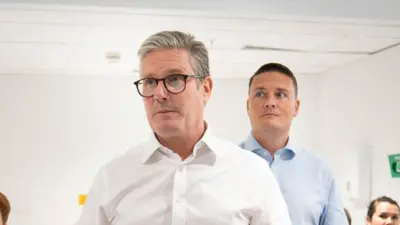We've updated our Privacy and Cookies Policy
We've made some important changes to our Privacy and Cookies Policy and we want you to know what this means for you and your data.
How will MPs hold ministers to account during coronavirus closure?
Image source, PA Media
- Author, Mark D'Arcy
- Role, Parliamentary correspondent
So Parliament returns in four weeks' time, perhaps longer.
In the meantime, the prime minister and his team will deploy enormous emergency powers and spend gigantic, unprecedented sums to combat the coronavirus.
And they will do so with no parliamentary oversight.
Events have moved so fast that there is no parliamentary body capable of providing some measure of scrutiny of the government's actions.
The idea had been gaining currency that the Liaison Committee, the super-committee of all the Commons select committee chairs, might have taken a role in quizzing the PM and other ministers, while Parliament was in recess - but the Liaison Committee has not been set up.
The government's decision to install Sir Bernard Jenkin as chair of the Liaison Committee caused a row, because he was no longer a committee chair himself.
To be sure, there are precedents in Robert Sheldon (who was chair between 1997-2001) and Alan Williams (2001-2010), and Sir Bernard was the long-serving chair of the Public Administration Committee. But other chairs were not keen that he should be parachuted in, to preside over them.
The row caused a delay, and MPs will not now debate the motion to appoint Sir Bernard until 22 April, with the unintended consequence that there is no overarching scrutiny mechanism available during the hiatus - a gigantic consequence for a rather niche procedural spat.
A possible substitute might be an informal process, in which the PM is questioned (probably by video-link) by the committee chairs, without it being a full parliamentary proceeding.
He could, of course, say no, and in any event, it might not be possible to muster sufficient weight behind the plan.
But the strategy is to mobilise a cross party alliance and suggest that he might find it valuable to face robust questioning of his actions.
The New Zealand option
Contrast this with the set-up agreed in New Zealand, where, before Parliament rose, they set up an 11-member committee of senior MPs, with an Opposition majority, to monitor events during their state of emergency.
The committee is chaired by the Leader of the Opposition, the National Party's Simon Bridges, and armed with the power to summon ministers and officials, and to see documents. Its hearings will be televised and live-streamed.
Thorough democratic scrutiny will be maintained.
The announcement of the government aid package for self-employed workers is probably just the first big policy initiative to emerge after Parliament has risen, and the exercise of extraordinary emergency powers surely demands more systematic monitoring than is currently possible.
To be sure, Mr Speaker Hoyle has moved fast to allow Commons select committees to hold meetings online, and that will provide some level of scrutiny, albeit fragmented.
And there's a wider point here; as we saw last week, when a cross-party Commons amendment pushed the PM into accepting that Parliament should review the existence of the emergency powers in the Coronavirus Act after six months, rather than after two years.
The most effective scrutiny of the government has come not from the official opposition, but from cross party alliances of heavy metal backbenchers - Harriet Harman and David Davis were two of the key movers in that amendment.
What is striking is how thin the scrutiny process is in the Commons at the moment, with question times and statements opening with inexperienced ministers being questioned by tyro shadow ministers.
Image source, PA Media
The turnover of MPs in the last couple of elections has removed a lot of experienced ex-ministers, and both frontbenches have a distinct lack of hardened veterans.
So committee questioning and backbencher questioning are the parts of the scrutiny process most likely to bring problems to light, which is why finding a way to give them an opportunity to ask questions, is so essential in these circumstances.
In the longer term, there is the promise of a Speaker's working group, to devise new systems to allow remote working and cope with what may be a long period where social distancing is required.
The remote working part of this is mostly a technical problem requiring robust and secure software, while social distancing will have a considerable impact on the centuries-old traditions of a Parliament which has always required its members to be physically present.
For example, the rule requiring MPs to be in the chamber to hear a statement, if they then want to pose questions to the minister making it, will clearly need some modification.
So, too, will the voting system based on herding MPs through crowded division lobbies.
Top Stories
More to explore
Most read
Content is not available








